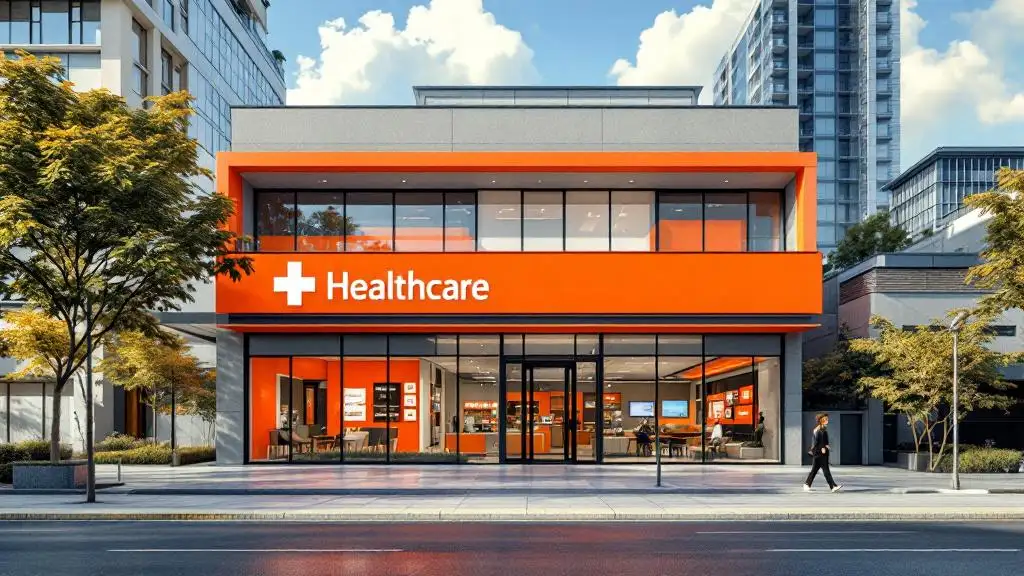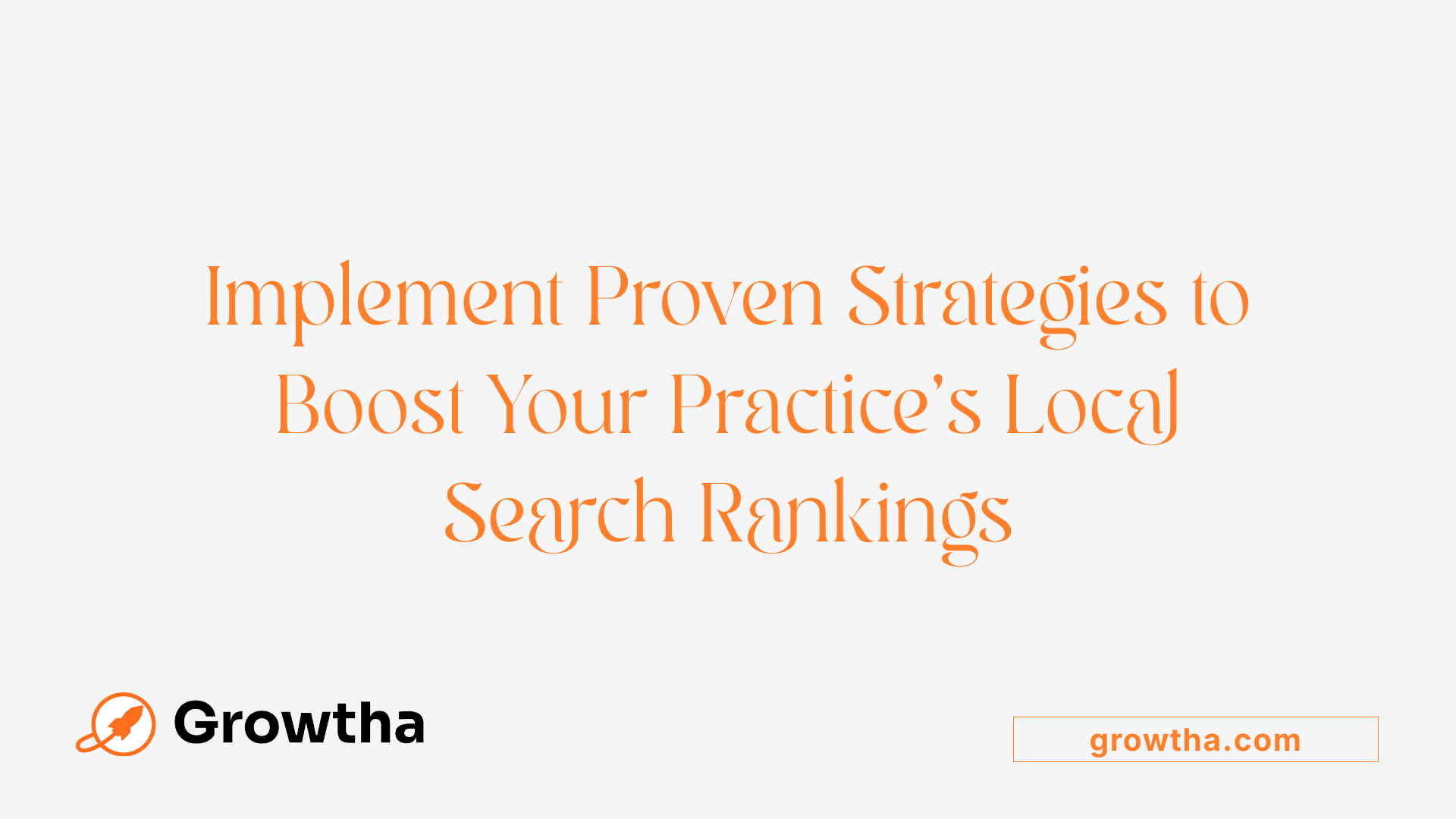The Role of Local SEO in Attracting New Patients
Boosting Healthcare Practice Visibility Through Local SEO


The Role of Local SEO in Attracting New Patients
Understanding the Importance of Local SEO in Healthcare Marketing
In today’s digital age, having a strong online presence is crucial for healthcare providers aiming to attract local patients. Local SEO emerges as a vital strategy that increases a healthcare practice’s visibility in local search results, maps, and directories. This article explores how local SEO contributes to patient acquisition, detailing strategies, best practices, and the components that make it an indispensable element of healthcare marketing.
What is Local SEO and Why It Matters in Healthcare

What is local SEO and why is it important for healthcare practices?
Local SEO is a specialized digital marketing strategy focused on enhancing a healthcare provider's online visibility within their local community. Its main goal is to ensure that when nearby patients search for healthcare services, the practice appears prominently in search results, especially in the local map pack.
For healthcare practices, local SEO is essential because approximately 46% of all Google searches are related to local health information. Moreover, about 78% of patients use Google to find healthcare providers, making local search visibility crucial for attracting new patients and retaining existing ones.
Implementing local SEO involves various tactics such as optimizing Google Business Profiles (formerly Google My Business), managing consistent citations of practice details across multiple directories, and encouraging satisfied patients to leave reviews. These efforts positively influence search engine rankings, boosting the practice’s credibility and trustworthiness. Additionally, local SEO enhances the practice's presence in local search results, maps, and featured snippets, making it easier for patients to find and choose their services.
A well-executed local SEO strategy also integrates localized content, tailored to address community health concerns, further establishing the practice as an authority in the area. Since mobile responsiveness and website speed significantly impact rankings and user experience—especially as 53% of mobile users abandon slow-loading pages—it’s vital for healthcare practices to optimize their websites for speed and mobile-friendliness.
Overall, local SEO helps practices stand out in a competitive healthcare landscape by attracting targeted local patients, increasing appointment rates, and building a solid online reputation. This targeted approach ensures that healthcare providers are easily discoverable when potential patients search for specific health services nearby, making local SEO a crucial tool in modern healthcare marketing.
Effective Local SEO Strategies for Healthcare Providers

What strategies can healthcare providers use to implement effective local SEO?
Healthcare providers aiming to improve their local search visibility can adopt multiple strategies. First, optimizing their Google My Business (GMB) profiles is crucial. This involves claiming, verifying, and routinely updating accurate and detailed information, such as practice hours, services offered, photos, and patient reviews. A complete and engaging GMB profile can significantly increase patient engagement and local ranking.
Next, incorporating location-specific keywords into website content boosts relevance in local searches. Creating dedicated location pages with schema markup helps search engines understand the geographical focus of the content, making it easier to appear in local 3-pack results.
Maintaining consistent NAP (Name, Address, Phone Number) information across all online platforms—including directories, review sites, and social media—is essential. This consistency signals credibility to search engines and improves rankings.
Encouraging satisfied patients to leave positive reviews on Google and other review sites influences both reputation and search rankings. Responding to reviews shows engagement and professionalism, which can boost practice authority.
Beyond these, enhancing website performance—particularly speed and mobile responsiveness—is vital. With 53% of mobile users abandoning slow-loading pages, ensuring a fast, mobile-friendly site improves user experience and enhances SEO.
Finally, earning backlinks from reputable local organizations, such as hospitals, community websites, or health blogs, can elevate your practice’s domain authority. These backlinks act as endorsements and improve your local visibility.
Implementing these strategies collectively helps healthcare practices attract nearby patients, stand out in local search results, and establish a trusted presence in their community.
The Impact of Local SEO on Online Visibility for Medical Providers

How does local SEO enhance online visibility for medical providers?
Local SEO plays a crucial role in boosting the online presence of healthcare practices. By optimizing Google Business Profiles, also known as Google My Business (GMB), practices ensure that their information appears accurately and prominently in local search results and on Google Maps. These profiles should include complete details such as operating hours, services offered, and appealing photos.
Building and maintaining consistent citations—mentions of the practice’s name, address, and phone number (NAP)—across healthcare-specific directories like Zocdoc and Healthgrades, as well as general business listings like Yelp and Google, strengthen local search rankings. These citations act as endorsements of the practice’s credibility.
Implementing localized keywords into website content, titles, and meta descriptions tailors the site to local search intent. For example, including geo-specific phrases like "family doctor in Denver" helps target potential nearby patients.
Creating location-specific content such as blog posts addressing local health concerns and community health events can further attract local traffic. Additionally, schema markup—structured data that clarifies website content—improves how search engines interpret the site, increasing chances for rich results in search listings.
Encouraging satisfied patients to leave reviews enhances the practice’s reputation and influences ranking algorithms positively. Regular online reputation management, which involves responding to reviews and resolving patient concerns, fosters trust and community engagement.
In essence, integrating these local SEO strategies ensures that medical providers are more visible in their community, leading to increased patient inquiries and appointments. This comprehensive approach helps practices stand out amidst local competition, connecting them effectively with nearby patients searching for healthcare services.
| Strategy | Benefit | Additional Details |
|---|---|---|
| Google Business Profile Optimization | Increased prominence in local search and maps | Up-to-date info, photos, posts, review management |
| Local citations and directory listings | Builds trust and reinforces local relevance | Consistent NAP across platforms |
| Localized Keyword Use and Content Creation | Attracts high-intent local patients | Geo-specific keywords in content and meta tags |
| Schema markup and Technical SEO Best Practices | Enhances search engine understanding and visibility | Structured data, website speed, mobile responsiveness |
| Online Reviews and Reputation Management | Elevates credibility and influences rankings | Encouraging reviews, responding professionally |
Gaining a strong local SEO presence enables healthcare providers to connect more effectively with their community. It serves as a digital front door, attracting nearby patients and increasing patient engagement and appointment rates.
Enhancing Patient Outreach and Engagement via Local SEO

How does local SEO contribute to increased patient outreach and engagement?
Local SEO plays a crucial role in expanding a healthcare practice’s reach within the community by improving its visibility in local search results. When practices optimize their Google Business Profile—updating accurate information, adding photos, scheduling posts, and managing reviews—they become more noticeable in the map pack and local Google searches. Such visibility directly influences patient decision-making, especially since nearly half of all Google searches are related to local healthcare information.
Using location-specific keywords in website content, meta descriptions, and service pages also helps attract targeted high-intent patients actively searching for nearby providers. Building local backlinks from reputable sources like local news outlets and community organizations further boosts domain authority and local search rankings.
Patient reviews are vital for reputation and rankings. Practices that encourage feedback and respond promptly foster trust and demonstrate care, making them more attractive to potential patients. Regularly managing reviews not only improves search visibility but also shows ongoing engagement and responsiveness.
Creating content tailored to local health concerns, such as blogs on regional health issues or preventive care tips, helps position the practice as a local authority. Location-specific landing pages optimized with neighborhood names and local keywords make navigating to services straightforward for patients.
Overall, blending online reputation management, content marketing, and technical SEO strategies increases practice visibility, attracts new patients, and encourages existing patients to stay engaged. This comprehensive approach ensures the practice remains competitive and accessible to the community it serves.
Components and Best Practices of Local SEO for Healthcare
What are the key components of local SEO tailored for healthcare providers?
Implementing effective local SEO for healthcare practices involves several essential strategies. First, claiming and maintaining an optimized Google Business Profile is fundamental. This profile should include accurate, current practice information such as location, hours, services, provider details, and high-quality photos. An optimized profile increases visibility in Google Maps and the local '3-pack' results, making it easier for nearby patients to find the practice.
Another critical aspect is ensuring that the practice’s NAP (Name, Address, Phone number) data is consistent across all online platforms. Uniform information across websites, directories, and citation sites helps build trust with search engines and improves local rankings.
Creating localized content enhances relevance. This includes developing location-specific pages, incorporating geo-targeted keywords into website content, meta tags, and headings, and utilizing schema markup to clearly indicate geographic relevance. Engaging content topics can address local health concerns, attracting community members searching for specific services.
Managing online reviews is also vital. Encouraging satisfied patients to leave positive feedback, responding thoughtfully to reviews, and highlighting patient testimonials build credibility and enhance reputation, factors that influence local search results.
Finally, earning backlinks from reputable regional sources, such as hospitals, health blogs, and local news outlets, can boost the site’s authority, leading to improved visibility and higher rankings in local searches.
How can healthcare providers optimize their Google Business Profiles?
Properly optimizing a Google Business Profile involves regularly updating all relevant details, including current operating hours, service offerings, and contact information. Uploading clear, professional photos of the practice and staff, along with posting updates about health tips or new services, keeps the profile active and engaging. Collecting and responding to reviews demonstrates active reputation management, builds trust, and contributes to higher rankings in local search results.
Practical Tips for Optimizing Local Search Presence
What practical tips can healthcare practices follow to optimize their local search presence?
To stand out in local search results, healthcare providers should start by claiming and verifying their Google My Business (GMB) profiles. Keeping all details up-to-date, including practice hours, services offered, and contact information, is essential. Enriching profiles with photos and regularly posting updates can also attract more local interest.
Creating localized content tailored to the community’s health concerns helps improve relevance. Writing blog posts, FAQ pages, and articles on common local health issues signals to search engines that your practice is authoritative and community-focused.
Gathering positive reviews from satisfied patients and responding promptly to feedback enhances your online reputation. Encouraging reviews across platforms like Google, Facebook, and healthcare review sites not only builds trust but also positively influences search engine rankings.
Implementing technical SEO best practices is crucial. Ensure your website is mobile-friendly, loads quickly, and uses schema markup to help search engines understand your content better. Incorporating local keywords naturally into website content and meta tags increases visibility for location-specific searches.
Regularly monitoring SEO performance metrics—such as search rankings, website traffic, and review volume—allows practices to assess what strategies are working well and where improvements are needed. Using tools like Google Analytics and Search Console can guide these adjustments.
Finally, building local backlinks by engaging with reputable community sources, local news outlets, and industry directories boosts your site's authority and improves ranking signals. Consistent citations of your business name, address, and phone number across multiple platforms also reinforce your local search presence.
Implementing these practices effectively increases your practice’s visibility, attracts targeted local patients, and elevates your reputation as a trusted healthcare provider within the community.
Benefits of Local SEO in Healthcare Marketing
What are the benefits of local SEO in healthcare marketing?
Local SEO offers numerous advantages for healthcare practices seeking to increase their visibility and patient base in their community. By optimizing online presence through Google Business Profiles, managing patient reviews, and ensuring consistent NAP (name, address, phone number) information across directories, practices can significantly improve their rankings in local search results.
Increased visibility means that when potential patients search for healthcare services nearby, your practice appears prominently in Google’s local 3-pack and map results. This visibility not only brings more website traffic but also results in higher patient inquiries and appointment bookings.
Moreover, local SEO enhances practice credibility. Engaging with patient reviews and actively maintaining an up-to-date, professional online profile builds trust within the community. Patients tend to favor providers with positive reviews and accurate information, which reinforces community trust.
Implementing effective local SEO strategies is also cost-efficient. Unlike traditional advertising, local SEO offers a higher return on investment because it targets patients actively seeking healthcare services in your area.
Finally, a well-executed local SEO plan can build a competitive edge over other practices. By appearing at the top of local search results, practices can attract more patients and establish themselves as leaders in their medical field within the local community.
Overall, local SEO is essential for healthcare providers to connect with nearby patients, increase appointments, and stay ahead in a competitive healthcare landscape.
Harnessing Local SEO for Healthcare Growth
In conclusion, local SEO is an indispensable tool for healthcare providers looking to expand their patient base and enhance their community presence. By implementing comprehensive local SEO strategies—including optimizing online profiles, managing reviews, creating relevant local content, and ensuring technical excellence—practices can significantly improve their visibility and credibility. This targeted approach not only attracts high-quality local patients but also builds lasting trust and engagement, ultimately driving growth and success in a competitive healthcare landscape.
References
- Local SEO for Doctors: Attract More Patients in Your Area - Promodo
- How to Attract New Patients with Local SEO for Healthcare
- Local SEO for Doctors: Why Is it so Important? - elk marketing
- Boosting Patient Engagement for Primary and Specialty Care ...
- How Local SEO Can Benefit Healthcare Providers
- 4 ways to use local SEO to attract more patients - Optometry Times
- The Power of SEO in Healthcare: How to Rank #1 and Attract More ...
- How Crucial Local SEO is For Medical Practice
- Healthcare local SEO best practices: attract more patients - Birdeye







